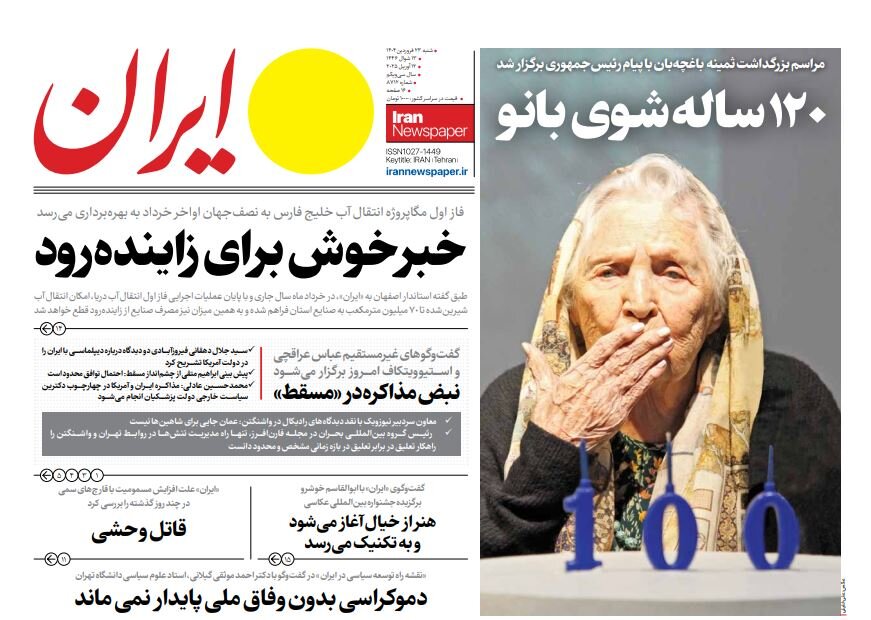Important points about Iran-U.S. negotiations

TEHRAN - In a note, the Iran newspaper discussed important points for the success of the new nuclear negotiations.
It quoted Seyyed Hossein Mousavian, a researcher at Princeton University, as saying: Negotiations with intermediaries or indirect negotiations should not be prolonged. Reaching an agreement through direct negotiations will be faster. Iran and the U.S. have many significant differences, but there are also issues on which both sides share common interests. Steve Witkoff is one of the unique diplomats in the Trump administration who, like Trump, seeks an agreement. Finally, the experience of the previous U.S. negotiator, Robert Malley, should not be forgotten. Robert Malley was very eager to revive the JCPOA and made a lot of efforts, but the Israeli lobby could not tolerate him and ruthlessly eliminated him. "Economic contracts" are very important to Trump. One of the factors that can accelerate and sustain the agreement is major economic contracts between Iran and the United States. The Netanyahu government wants to expand these confrontations and involve the U.S. in a military confrontation with Iran. Therefore, the Netanyahu government will use all its influence agents to bring the negotiations between Iran and the United States to a failure.
Farhikhtegan: Global public opinion will have no choice but to accept existing narrative
In a commentary, Farhikhtegan addressed Iran's weakness in the face of Trump's media campaign and wrote: One of these weaknesses is the lack of figures who can speak on behalf of Iran at the international level. The JCPOA experience demonstrated why it is vitally important in the media battle with the United States to have people who are both trusted by the international community and who can present Iran's message sensibly and officially. At present, and given the lack of this tool, whatever the outcome of the negotiations, Trump will declare himself victorious, and international public opinion will have no choice but to accept the existing narrative. Today, there is a need for a campaign that includes diplomatic, media, or even cultural figures who have a relative understanding of international issues and can appear in reputable global media outlets and manage the affairs. A campaign that knows the general lines of Iran's message and prepares them for sensitive moments. If negotiations are underway, these figures can announce our main and fundamental point of view before Trump uses the outcome for his benefit.
Arman-e-Emrooz: Friends and foes of negotiation
Arman-e-Emrooz spoke with political expert Peyman Khajavi about the internal and external enemies of the negotiations between Iran and the United States that started in Oman on Saturday. He said: The basis of international relations in the contemporary world is based on dialogue and reaching agreements between governments. It must be noted that Israel is a serious opponent of negotiations at the international level. Israel’s political existence is defined in a way that it requires permanent hostility in the region. Therefore, this regime and its lobbies have always been against any dialogue between Iran and the United States. There are also groups within the country that see the continuation of their political life dependent on the continuation of tension between Iran and the United States. These groups have taken positions in complete coordination with Israeli lobbies in recent years. Additionally, another movement, commonly called “beneficiaries of sanctions,” has also emerged. These groups have taken advantage of the sanctions by forming economic networks. In such a situation, it is necessary to adopt a realistic view of negotiations, avoid internal competition on national issues, and focus on long-term national interests to achieve stability and development.
Hamshahri: What is Iran’s red line in the negotiations?
The Iranian and American teams arrived in Muscat, the capital of Oman, before the afternoon of Saturday, April 12, and began the negotiations indirectly after meeting with the Omani Foreign Minister. The Omani Foreign Minister, as an intermediary, transmitted messages between the two sides. According to some sources, the necessity for the American delegation not to use threatening language, the necessity to avoid presenting any framework and excessive demands by this team regarding the nuclear program, as well as the necessity to refrain from raising any discussion on the issue of Iran’s defense industry, are part of Iran’s red lines, and Iran will not accept threatening language or crossing red lines in negotiations under any circumstances. Iran is always ready to build confidence about the peaceful nature of its nuclear program in exchange for the lifting of sanctions. So, the ball is in the Americans' court, and if the Americans sincerely say that they are only concerned about nuclear bombs, negotiations will not be difficult. But if the Americans hypocritically enter the scene and demand too much, they must also accept international responsibility for undermining negotiations.
